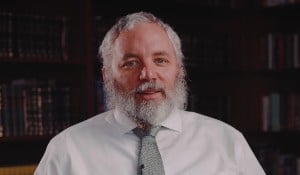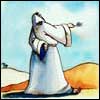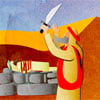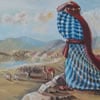Value systems differ from society to society, but we all agree that murder of innocent people is unconscionable. Why is it wrong to take a life at whim? Why are we against killing for sport? Well, that's a ridiculous question, isn't it? Anyone who doesn't already know the answer is either a fool or an incurable criminal.
We all cringe at collective punishment. To punish the innocent alongside the guilty is what we consider cruel and unusual; our very souls are repulsed by such things. We intrinsically echo Abraham's cry, "It is a sacrilege to slay the righteous alongside the wicked."1
Yet when we consider who Abraham was and whom he was talking to, we find it difficult to believe that he could speak this way. Abraham wasn't talking to a despotic demagogue or to a nachalnik in a Soviet gulag. He was talking to G‑d!
Man of Faith
Abraham was a man of exemplary faith; he followed G‑d's every directive with unerring loyalty. If G‑d requested it, Abraham believed it was just. He sent away his concubine, circumcised himself at an old age and was prepared to sacrifice his only son, all at G‑d's instruction. Abraham trusted implicitly that anything G‑d wants must be good.
Yet, when G‑d informed Abraham that Sodom and Gomorrah would be destroyed, he was appalled. Notwithstanding his incredible faith, he demanded of G‑d, "Would you slay the righteous alongside the wicked? Will the judge of all the earth not do justice?" Here is Abraham, a man of implicit faith, accusing G‑d of injustice and possibly even murder!2
Separating Light from Dark
On the first day of creation, G‑d "distinguished between light and darkness."3 The Midrash interprets the words "light" and "darkness" as a metaphor for the righteous and the wicked. On the first day of creation, G‑d separated the righteous from the wicked.4
What is the purpose of this separation?
In a novel interpretation by chassidic master Rabbi Pinchas Horowitz of Frankfurt (1730-1805), it is explained that this separation is reserved for those unique moments when the majority of humanity has turned wicked. When the righteous are in the majority, the opposite is true: the righteous and the wicked are joined.
When the righteous are in the majority, G‑d permits the wicked few to be absorbed into the majority and thus the wicked are spared. But, the very rule of majority that absolves the wicked when they are in the minority also condemns the righteous when they are in the minority.
It was for this possibility that G‑d separated the light from the darkness, or the righteous from the wicked. On those rare occasions when this separation is activated it effectively suspends the rule of majority and the righteous are thus judged on their own merit.
If the law of majority were not reversed on such occasions, the entire human race would perish. The law that was intended as an instrument of compassion would have become an instrument of cruelty. Concerned for the survival of humanity, G‑d provided for the suspension of this law on the very first day of creation.5
Back To Abraham
This insight lends new perspective to Abraham's words. When Abraham heard that the entire population of Sodom would die, he assumed that the righteous were to be punished along with the wicked by majority rule. Since this was not a judgment of humanity, but of Sodom, he assumed that G‑d had permitted the rule of majority to stand.
He pleaded with G‑d to view the judgment of Sodom in global terms. "Shall the judge — of the entire earth — not do justice?" he cried. Is it not true that when you judge the entire earth you waive the majority rule and do justice to the righteous on their own merit?6
Abraham was not accusing G‑d of injustice; he was making a legal argument. The judgment of an entire city, argued Abraham, should be akin to the judgment of the entire human race, and the rule of majority should be suspended.
A Personal Application in our Own Lives
G‑d actually agreed with Abraham's assertion and assured him that the righteous people of Sodom would not be slain; the fact of the matter was there were no righteous people in Sodom. As G‑d said to Abraham, "Had I discovered even ten righteous men in all Sodom, I would have spared the entire city."7
This teaches us an important lesson. We often judge ourselves in the court of our own opinion. We know our weaknesses and often let them drive our perception of ourselves. We think to ourselves: if I am so limited and weak, I must be a failure.
The human psyche is filled with glitches. We suffer from all kinds of spiritual and emotional maladies. We are jealous, insecure, arrogant and narcissistic. We are indulgent, greedy, dishonest and impatient. The list goes on and on. We all know our shortcomings.
When the reflective glare of an honest measuring-stick becomes unforgiving, Abraham's plea challenges us with astounding relevance.
When the entire earth is judged, the righteous are not punished on account of the wicked; they are judged by their own merit. In a similar vein, when we judge our entire persona we ought not dismiss our redeeming factors just because they are scarce.
Furthermore, if the righteous were slain on account of the wicked, humanity would become extinct. When we dismiss our strengths on account of our weaknesses we assure our own failure and slowly extinguish our spirit.
After the flood, one righteous family rebuilt the human race. Highlighting our strengths and allowing our redeeming qualities to thrive will help us redeem ourselves.







Start a Discussion